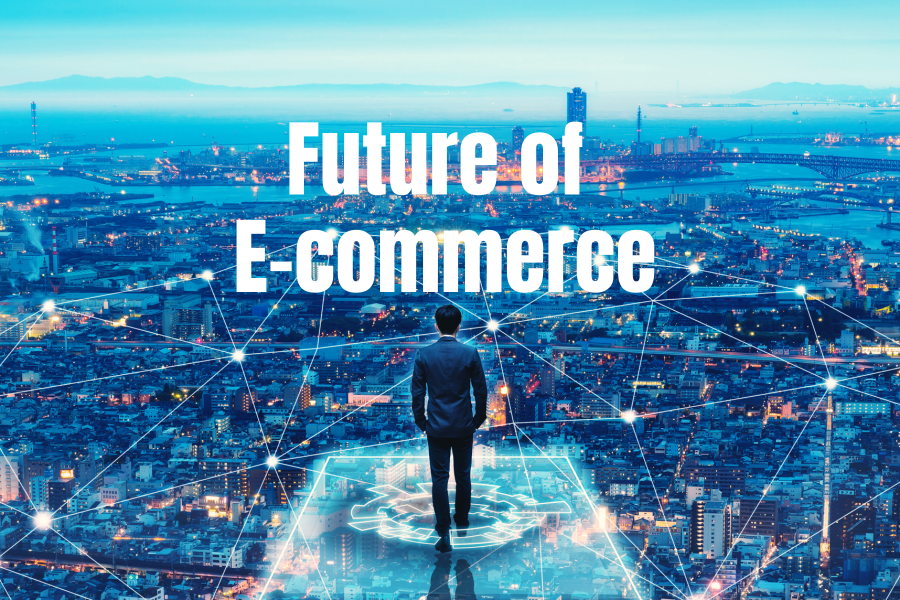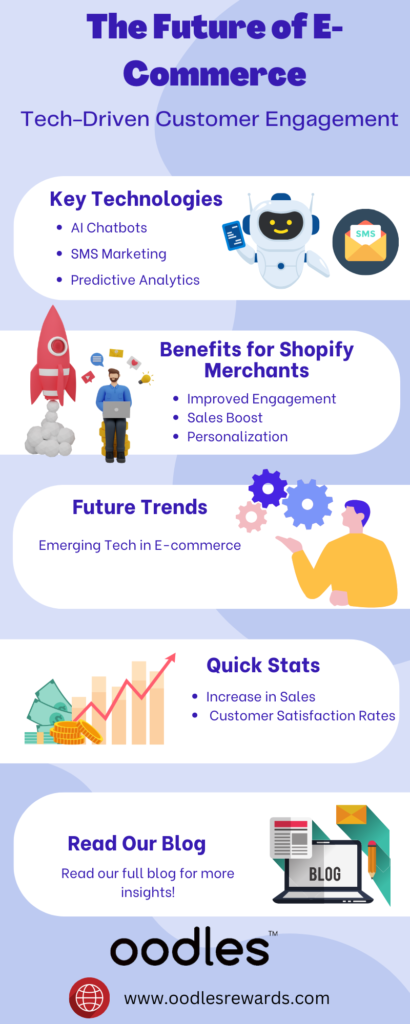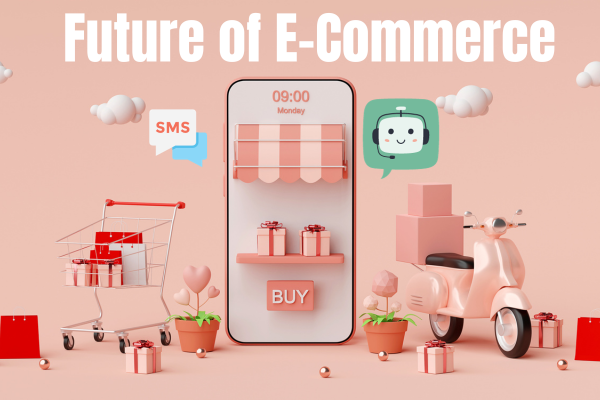
Introduction: As we journey through 2024, the realm of e-commerce continues to expand and evolve, with Shopify merchants at the forefront of this transformation. Embracing innovative technologies like AI chatbots, conversational AI, and mobile marketing trends has become crucial for businesses seeking to enhance customer engagement and drive return on investment. In “The Future of E-commerce: Leveraging Tech for Enhanced Customer Engagement,” we explore how these technological advancements are revolutionizing the way online retailers interact with their customers. From loyalty points systems to SMS marketing campaigns, each tool and strategy plays a pivotal role in cultivating customer loyalty and increasing sales. The emphasis on conversational AI chatbots and customer loyalty programs is reshaping the e-commerce landscape, offering a more personalized and responsive shopping experience. This blog will delve into how these technologies are not just trends, but essential components for success in today’s digital marketplace, and how Oodles’ innovative solutions are perfectly aligned to support Shopify merchants in this new era.
The Role of AI and Conversational AI in Enhancing Customer Engagement
In the current digital age, AI and conversational AI have emerged as key players in revolutionizing customer engagement for Shopify merchants. These technologies are no longer futuristic concepts; they are real-world solutions driving tangible improvements in e-commerce.
AI Chatbots: The implementation of AI chatbots has been a game-changer, particularly for online retailers. These chatbots, with their advanced capabilities, can handle a range of customer interactions, from basic inquiries to complex support requests. They provide instant, 24/7 support, significantly improving customer satisfaction and freeing up human resources for more complex tasks.
Conversational AI: Going beyond standard chatbots, conversational AI offers a more sophisticated and personalized interaction. It understands natural language, interprets customer needs, and provides responses that are not just accurate but contextually relevant. This level of interaction ensures a seamless shopping experience, fostering a stronger connection between the brand and its customers.
Impact on Customer Engagement: The integration of these AI technologies has led to a remarkable improvement in customer engagement. By providing prompt and personalized responses, they enhance the overall customer experience, which is a key factor in building customer loyalty. Additionally, AI-driven insights help merchants understand customer preferences and behavior, allowing for more targeted and effective marketing strategies.
Enhancing ROI: One of the most significant impacts of these AI tools is the improvement in return on investment (ROI). By automating routine interactions, they reduce operational costs. More importantly, they contribute to increased sales through personalized recommendations and improved customer retention.
In this section, we explore how these AI tools are not just adding value but are becoming essential components for Shopify merchants aiming to thrive in the competitive e-commerce landscape.

Leveraging Loyalty Programs and SMS Marketing for Elevated Customer Experiences
In the landscape of e-commerce, particularly for Shopify merchants, the importance of fostering customer loyalty and utilizing effective marketing strategies like SMS marketing campaigns cannot be overstated. These strategies play a crucial role in not only retaining customers but also in significantly boosting sales and enhancing overall customer engagement.
Loyalty Programs: Implementing a customer loyalty program is a powerful way to reward and retain customers. These programs, often leveraging loyalty points, incentivize repeat purchases and turn occasional buyers into brand advocates. The key is personalization – offering rewards that are tailored to individual customer preferences and shopping behaviors. This approach not only enhances the customer experience but also strengthens the emotional connection with the brand.
SMS Marketing Strategies: In an era where mobile devices are ubiquitous, SMS marketing emerges as a highly effective channel. SMS Marketing Campaigns offer direct and personal communication with customers. They are not just for promotions; they can be used for order updates, feedback requests, and personalized recommendations. The immediacy and high open rates of SMS make it an invaluable tool for engaging customers and driving sales.
Integrating with AI: The integration of AI with loyalty programs and SMS marketing can take these strategies to the next level. AI can analyze customer data to identify the right rewards for loyalty programs and the most effective messages and timings for SMS campaigns. This data-driven approach ensures that each interaction is relevant and likely to elicit a positive response.
Impact on Sales and Customer Engagement: These strategies have a direct impact on increasing sales and enhancing customer engagement. By offering personalized experiences through loyalty programs and reaching customers directly through SMS, businesses can create a more engaging and satisfying shopping experience. This not only drives repeat business but also fosters a loyal customer base.
In this section, we delve into how Shopify merchants can effectively implement these strategies to not only keep up with the competition but to set new standards in customer engagement and loyalty.

Embracing Mobile Marketing Trends to Drive E-commerce Success
The surge in mobile usage has opened new avenues for Shopify merchants to engage with customers. Staying abreast of mobile marketing trends is no longer optional; it’s a critical component of a successful e-commerce strategy. This section explores how leveraging these trends can significantly enhance customer engagement and increase sales.
Optimizing for Mobile: The first step in embracing mobile marketing is ensuring that online stores are fully optimized for mobile devices. This means not just mobile-responsive designs but also mobile-friendly user interfaces, fast loading times, and easy navigation. A mobile-optimized site enhances the user experience, which is crucial in retaining customers and reducing bounce rates.
Mobile-First Marketing Strategies: Developing marketing strategies with a mobile-first approach is key. This includes creating content that is easily consumable on mobile devices, such as short and engaging product videos, interactive content, and easy-to-read text formats.
Location-Based Marketing: Utilizing location-based marketing techniques can provide a significant edge. Sending targeted offers and promotions to customers based on their geographic location can drive foot traffic to physical stores and increase online engagement.
Incorporating SMS Marketing: As discussed earlier, SMS marketing strategies are highly effective in a mobile-centric world. Regular, personalized SMS updates keep customers informed and engaged with the brand. This direct line of communication is invaluable in building a loyal customer base.
Leveraging Mobile Apps: Developing a mobile app can provide a more seamless and interactive shopping experience. Features such as push notifications, loyalty programs, and easy checkout processes can drive engagement and sales.
Impact on Customer Referrals and Sales: A strong mobile marketing strategy not only increases customer engagement but also encourages customer referrals. Satisfied mobile users are more likely to recommend a brand to others, further increasing the potential for sales.
In this section, we highlight the importance of mobile marketing trends in the current e-commerce landscape and how Shopify merchants can leverage them to create a more dynamic and successful online business.

Harnessing AI Chatbots for Enhanced Customer Service and Sales
The integration of AI chatbots in e-commerce platforms, particularly for Shopify merchants, is revolutionizing the way businesses interact with their customers. These conversational AI chatbots are not just customer service tools; they are sophisticated sales assistants capable of driving conversions and enhancing the overall customer experience.
Automating Customer Service: AI chatbots excel in providing immediate responses to customer queries, reducing wait times and increasing customer satisfaction. They can handle a wide range of questions, from product details to order status, providing accurate information around the clock. This level of service efficiency not only improves customer engagement but also builds trust in the brand.
Personalized Shopping Assistance: Beyond basic queries, AI chatbots offer personalized shopping assistance. They can recommend products based on customer preferences and browsing history, effectively cross-selling and upselling. This tailored approach not only enhances the shopping experience but also increases the average order value.
Seamless Integration with E-commerce Platforms: Modern AI chatbots seamlessly integrate with e-commerce platforms like Shopify. This integration allows for a smooth flow of information between the chatbot and the store, enabling more effective and personalized interactions.
Driving Sales and Customer Loyalty: The proactive engagement of AI chatbots contributes significantly to driving sales. By initiating conversations, offering personalized recommendations, and providing prompt support, they create a more engaging shopping environment. This proactive approach not only boosts sales but also fosters long-term customer loyalty.
In this section, we delve into the multifaceted role of AI chatbots in e-commerce, highlighting their potential as a tool for not just customer service, but also as a driver of sales and an enhancer of the overall customer journey on Shopify platforms.

The Future of E-commerce: Predictive Analytics and Emerging Technologies
As we look towards the future of e-commerce, it’s clear that predictive analytics and emerging technologies will play a pivotal role in shaping the landscape. For Shopify merchants, understanding and leveraging these advancements can be the key to staying ahead in an increasingly competitive market.
Predictive Analytics: This technology goes beyond traditional data analysis. By utilizing machine learning and AI, predictive analytics can forecast future buying trends and customer behaviors. This insight allows merchants to stock products more effectively, tailor marketing campaigns, and ultimately, offer a more personalized shopping experience. For instance, predictive analytics can identify which products a customer is likely to purchase next, leading to more targeted and effective recommendations.
Emerging Technologies: Alongside predictive analytics, other emerging technologies are also set to transform the e-commerce sector. Augmented Reality (AR) is one such technology, offering customers the ability to visualize products in their own space before purchasing. This not only enhances the user experience but also helps in reducing return rates. Additionally, advancements in voice search and shopping are making it easier for customers to shop online, further expanding the reach of e-commerce.
Integration with Current E-commerce Strategies: The integration of these technologies with current e-commerce strategies, such as loyalty programs, SMS marketing, and AI chatbots, can create a more cohesive and efficient shopping experience. For example, predictive analytics can enhance loyalty programs by predicting which rewards a customer might prefer, making the program more effective.
Preparing for the Future: To stay competitive, Shopify merchants must not only adapt to these technologies but also anticipate future trends. Keeping an eye on technological advancements and continuously evolving strategies will be crucial for success in the ever-changing landscape of e-commerce.
In this final section, we explore the future of e-commerce, focusing on how predictive analytics and emerging technologies will continue to shape customer engagement and sales strategies, ensuring that Shopify merchants remain at the forefront of this evolution.
Conclusion
As we navigate through the dynamic and ever-evolving world of e-commerce in 2024, it’s evident that the integration of technology in enhancing customer engagement is not just a trend but a necessity for Shopify merchants. Throughout this comprehensive exploration, “The Future of E-commerce: Leveraging Tech for Enhanced Customer Engagement,” we’ve delved into the transformative impact of technologies like AI chatbots, conversational AI, SMS marketing, and predictive analytics. These tools are redefining the way online businesses interact with customers, offering personalized experiences that drive loyalty and sales.
The journey through various strategies, from loyalty programs to the latest in mobile marketing trends, highlights the importance of a multifaceted approach in today’s competitive digital marketplace. The key takeaway is the need for Shopify merchants to not only embrace these technological advancements but to weave them into the very fabric of their customer engagement strategies.
Looking ahead, the future of e-commerce promises even more exciting developments. As predictive analytics, AI, and emerging technologies like AR continue to evolve, they will open new avenues for personalized, efficient, and engaging customer experiences. For businesses, staying abreast of these changes and adapting accordingly will be crucial in maintaining a competitive edge.
At oodles, we are committed to providing Shopify merchants with the tools and insights needed to navigate this landscape successfully. Our solutions are designed to harness the power of these technologies, ensuring that our clients are well-equipped to meet the needs of their customers today and in the future. In embracing these advancements with Oodles, businesses are not just keeping up with the times; they are setting the pace for the future of e-commerce.

